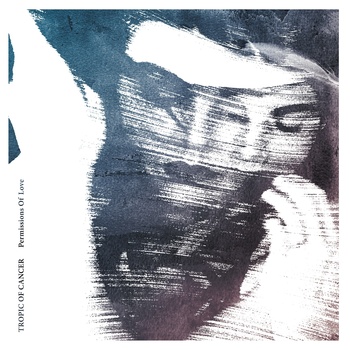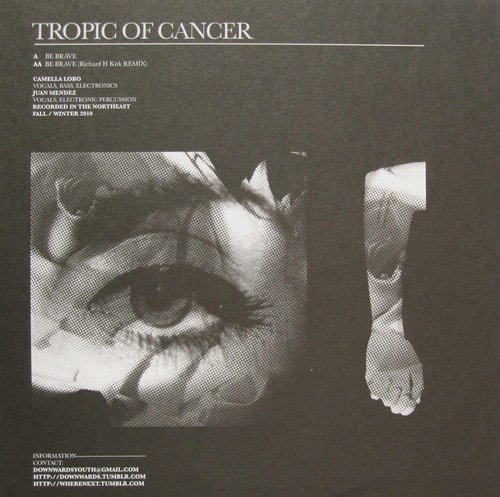Tropic of Cancer inspire real ardour, even obsession, from their small but ever-swelling fanbase. They’re a true cult band. But they’re also more than that.
For a start, their devotees really are a disparate bunch: card-carrying Tropic of Cancer fans include techno refugees, dedicated shoegazers, dapper goths, paisley psych revivalists, minimal synth nerds and pop pickers; what links them all is that they care deeply about music, and have a weakness for morbid romanticism. The sound Tropic of Cancer make is ethereal and elusive but also exacting – their lyrics are barely discernible, and yet this is music that really connects, really communicates.
I keep writing ‘they’ and ‘their’, but ‘she and ‘hers’ would be more accurate: Tropic of Cancer is one woman, Camella Lobo. What began as a collaboration with her partner Juan Mendez (best known for his work on Sandwell District as Silent Servant) has developed into a solo project, culminating in the release this month of an EP on Italy’s Mannequin label entitled Permissions Of Love [you can stream it in full here].
Tropic of Cancer debuted way back in 2009, with the 10″ single ‘The Dull Age’/’Victims’. This record – a majestically poised synthesis of Suicide-style drum patterns, plangent guitar lines and vocals not so much sung as sighed – was released on Downwards, the label best known for defining hard British techno in the 1990s with releases from the likes of Surgeon, Female and Regis (aka label boss Karl O’Connor). Downwards would go onto rep a number of American shoegaze and goth-influenced acts – among them Dva Damas, Pink Playground, The KVB and The Vivids – via its DO series, but at the time ‘The Dull Age’ appeared a striking anomaly in the label’s catalogue. Best of all, virtually no information about who actually made the record was available – Juan Mendez was vaguely known to have played a role, but who was the grave-looking girl pictured with him on the insert? The origins of the record seemed as mysterious as its contents.
Following a handful of tentative live shows, Lobo became more visible, and her ultimate control over the project better understood. Their second 10″ for Downwards, ‘Be Brave’, which found them embracing pop song-form and switching up undead andante for full-throttle motorik (taken even further on a remix by Cabaret Voltaire‘s Richard H. Kirk), arrived at the beginning of last year, and turned heads. This was quickly followed by their first 12″, the The Sorrow Of Two Blooms, on London-based Blackest Ever Black [full disclosure: founded by FACT’s Kiran Sande], a deeply moving and exquisitely executed EP that deservedly became a word-of-mouth underground hit, vastly expanding the band’s audience while also helping establish the label. Lobo spent the remainder of 2011 playing live shows (including an extensive European tour in support of HTRK) and working on Permissions Of Love, which is now finally seeing the light of day.
On the eve of Permissions‘ release, and midway through her tour of the US West Coast with Demdike Stare, FACT got hold of Lobo to talk in-depth about life and death in the Tropics.
“It is what it is. I don’t know if that sounds pretentious, or amateurish, or whatever, but I try not to overthink anything I do.”
 What exactly is Tropic Of Cancer? Is it a solo project, a duo, a group?
What exactly is Tropic Of Cancer? Is it a solo project, a duo, a group?
Camella Lobo: “There’s an understandable amount of confusion about who is in Tropic Of Cancer. Essentially, it’s my solo project. I’ve obviously been involved since Juan Mendez and I formed the band in 2007. All of the releases – on Downwards and Blackest Ever Black – up until this most recent EP, Permissions Of Love, have been a collaboration between he and I.
“Permissions Of Love marks my first efforts with Tropic Of Cancer as my own solo project. As far as additional members go, I brought on Taylor Burch (of DVA DAMAS) to help me execute the songs in a live setting. I teach her the parts I can’t play on my own live. She has toured with me and will continue to be involved in the live shows into the future. Juan remains involved in some of the post-production and mixing process as well.”
 It must be difficult not to be self-conscious about all the “tags” that are thrown around in relation to your music – goth, shoegaze, the dreaded “cold wave”, etc… do you think you ever find yourself consciously or subconsciously working to resist these identifications?
It must be difficult not to be self-conscious about all the “tags” that are thrown around in relation to your music – goth, shoegaze, the dreaded “cold wave”, etc… do you think you ever find yourself consciously or subconsciously working to resist these identifications?
CL: “That’s a tough question. Goth, shoegaze and even, to a very small degree, cold wave are all genres that undeniably influence my music. However, I like to think of them as coming together – along with many other influences – to create a unique but familiar filter through which Tropic Of Cancer ekes out its own sound.
“I’m almost certain that every one of my songs has the word ‘love’ in it.”
“I think that’s why an ultimate classification as ‘goth’ ‘minimal’ ‘shoegaze’ or what have you, is so difficult for people. And I actually love being a part of each of those scenes in their own right with Tropic Of Cancer. It’s really cool – one night we’ll play a goth club, and the next is a shoegaze festival or a weird minimal synth or techno night. I think of it as getting the best of all of these worlds without having to suffer under the confines of a single label or scene.
“As far as subverting those ‘tags’ and classifications, there is never a conscious effort to create music that alienates Tropic Of Cancer from any one of those genres. I honestly have little control over the core aesthetic in my music – it simply is what it is. I don’t know if that sounds pretentious, or amateurish, or whatever, but I try not to overthink anything I do. I just make songs and that’s what they sound like.”
There tends to be a lot of distortion and reverb on your vocals, and they’re buried deep in the mix – it’s near-impossible to make out distinct words. So I wondered if you could tell us what, broadly speaking, your lyrical themes and concerns are?
“I’m almost certain that every one of my songs has the word ‘love’ in it. I’m obsessed with the concept of love, for better or worse. Themes of romance, longing and suffering are prevalent in my lyrics. Mostly my lyrics are hyperbolic dramatizations of experiences I’ve had in my own life. Or sometimes they’re somewhat fictitious narratives based on hunger, human weakness and the dark distances that come between people in love. Thank goodness the lyrics are distorted or I might be quite embarrassed at the ridiculousness of it all.”
 At what point did you begin to feel like a “real” band, if you know what I mean? At what point did it begin to feel more than a hobby? Or does it still it feel like that?
At what point did you begin to feel like a “real” band, if you know what I mean? At what point did it begin to feel more than a hobby? Or does it still it feel like that?
CL: “I suppose recently Tropic Of Cancer has felt more like a ‘real’ band than ever before. Juan and I had been making music as Tropic Of Cancer for nearly five years when we started getting more attention as a ‘band-band’. The Sorrow Of Two Blooms EP was a turning point in that sense. For whatever reason people were really excited about it. But surely that had a lot to do with reaching a new audience through Blackest Ever Black, As well as integrating an element of pop structure and sensibility on songs such as ‘A Color’ and ‘Be Brave’. Before then, we’d always had a bit of a cult following but nothing to that degree. But yes, it’s also started to feel less like a hobby since I’ve assumed the solo role and played live more frequently.”
“Recently Tropic Of Cancer has felt more like a ‘real’ band than ever before.”
 How did you come to work with the labels you’ve released music through – Downwards, Blackest Ever Black and Mannequin?
How did you come to work with the labels you’ve released music through – Downwards, Blackest Ever Black and Mannequin?
CL: “Working with Downwards and Blackest Ever Black has felt very familial. In short, the people who run those labels have all been very close friends – for several years in the case of Downwards. Tropic Of Cancer broke that insularity in working with Mannequin Records, which was a little scary for me personally. Not that it has anything to do with the label. Mannequin is a great label. I think the difficulty had more to do with the uneasiness that comes along with handing over something you created to someone new, as well as the fact that it was me and only me that made this EP. It almost felt as if I were leaving the nest. However, everything has worked out well and I’m happy to have had that experience and be included among some of the inspiring artists that are under the Mannequin umbrella, especially Mushy.”
“Working with Downwards and Blackest Ever Black has felt very familial.”
Tropic of Cancer seems to be becoming more prolific as a live entity – last year you toured Europe with HTRK and you’re currently supporting Demdike Stare on their US West Coast tour. How has the live experience been for you to date, and do you feel like you’ve now hit your stride?
CL: “We’re almost there. The live shows have certainly evolved a bit from the early days when Juan and I were playing together as Tropic Of Cancer. Bringing Taylor on has been a really great experience. Her and I have an innate connection on stage and she really understands the aesthetic of my music, which had been a difficulty in the past when considering bringing others into the fold.
“However, I still think we have a ways to go when it comes to the depth of sound on stage. We’re redesigning the current live set-up and adding more analogue elements in an attempt to get the sonic and pissed-off presence we’re looking for. The constant challenge is that we’re limited to two people and we can only do so much live. But I’m not looking to add anyone else to the live show at this point, so hopefully we can find a balance somewhere. It’s definitely still a work in progress.”
What experience, if any, did you have of writing or performing music prior to starting Tropic Of Cancer?
CL: “I didn’t have much experience working on music before Tropic Of Cancer, though music has been a passion of mine from an early age. I grew up singing in Catholic church choirs and had some minor vocal training later in life. As far as composing or writing music, collaborating with Juan was my first real project, though I’ve longed to be doing this all my life. I’m also a writer, so relying on music as a vehicle for my written work is the most perfect thing I can imagine. I’ve never felt happier.”
 You moved fairly recently from the Midwest to LA. Would you say the change in climate – actual and cultural – has impacted on you or your music?
You moved fairly recently from the Midwest to LA. Would you say the change in climate – actual and cultural – has impacted on you or your music?
CL: “I grew up in LA but recently lived in the Midwest for a few years for work. It was an amazing experience and the weather there definitely influenced the nature of our sound. There were many dark basement days during the insane winters, which allowed Juan and I to get a lot more done than we would have in LA. This is exactly why I chose to live a little ways outside of the city once I moved back to LA. I live in a somewhat sleepy seaport town called San Pedro in the Port of Los Angeles. I adore this area. Although it’s considered quite beachy, it has a very noir, industrial quality to it. The constant fog also helps add balance to this relentless California sun. It’s been very easy to work on Tropic Of Cancer here.”
“I grew up watching ’50s and ’60s horror movies with my mother, and developed an absolute obsession with Halloween.”
Do you feel part of any kind of “scene” in LA?
CL: “As far as the LA scene goes, I step in and out of it. I wouldn’t say I’m terribly involved in what goes on around here culturally, so I can’t really offer much of an inside perspective on the ‘scene’. The Part Time Punks clubnight at The Echo has been our LA lighthouse for many years – even those spent in the Midwest. There’s a strong scene that revolves around shoegaze, punk, goth and minimal synth music, and there are many tireless purveyors of those genres that work really hard to keep things weird.
“There’s also a little bit of an evolution happening in LA at the moment, as there has been a seemingly mass exodus here of interesting bands and people who were previously living in New York, such as Cold Cave and Prurient/Vatican Shadow. Nights like Slow Motion at Medusa in LA are starting to bring everything together. We’ll see where it goes.”
What’s next for Tropic Of Cancer?
CL: “The only solid plans I have for the future are to keep working on new music and see where that takes things. I’d love to tour somewhere outside of the US again this year, but there are no concrete commitments thus far. There is only talk.
“Things that can be counted on are a Tropic release on Blackest Ever Black later this year, or early next – whether it will be an EP or an album remains to be seen. I also have a somewhat artier release alongside Moon Duo, which is coming out through a really interesting publishing platform based in Antwerp called Sleeperhold Publications.”
“It’s like trying to change your preference from blondes to brunettes. In the moment of truth, you know which one is going to turn your head.”
Where did the thirst for all this morbid romanticism come from in the first place?
CL: “I don’t know if I can pinpoint that exactly. In reference to the morbidity – I grew up watching ’50s and ’60s horror movies with my mother. She was super into Hitchcock and films like The Bad Seed and Night of the Living Dead. As a child, I became intrigued by personalities like Vincent Price and Elvira, and developed an absolute obsession with Halloween. So maybe that’s where this slow-burning fascination with death, life after death, and the supernatural came from.
“As I said before, I’m a bit of a romantic, so it’s a natural pairing when everything comes together to form a distinct vision for Tropic Of Cancer. The end result incorporates the idea of a love so supernatural it lasts beyond death, but also a love that is sometimes not strong enough to conquer human weakness in the living.
“I’ve casually attempted to resist my draw to romance and morbidity, but that’s almost like trying to change your preference from blondes to brunettes. In the moment of truth, you know which one is going to turn your head.”
Tim Purdom
Tropic of Cancer’s Permissions Of Love EP is out May 28. More information here.









































